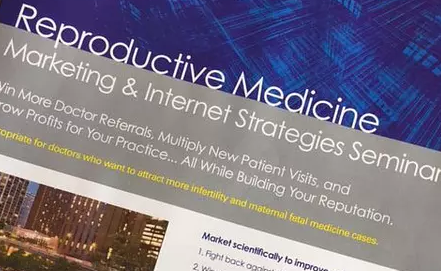I was disturbed by a recent brochure I received from a medical marketing company targeting Reproductive Endocrinologists. The company offers to help reproductive endocrinologists ”Fight back against aggressive competition, win at digital marketing, make new locations more profitable, increase revenues consistently, and increase your IVF volume”. Fourteen deliverables were mentioned, none of which mentioned attracting patients by providing great care, which many of the RE’s that I know do indeed provide.
As you whole-heartedly seek to have a baby, I am saddened by the idea that you are treated as a commodity to be captured. But with the money that people spend each year on fertility care ( 2 billion dollars) the reality is that many practitioners and professionals have built their careers around your business. In addition to Reproductive Medicine Centers, entities wanting your business include “Attain” type insurance programs, fertility coaches, sperm banks, and yes, acupuncturists.
So to assemble the best team of practitioners, rather than be directed by search engines to slick websites, I have a few suggestions for you.
Many of my patients do indeed cautiously vet the doctors they ultimately choose. Others are understandably overwhelmed by the choices.
Here is my advice on sorting through the myriad of practitioners and services offered:
- Educate yourself about a doctor’s work. Many of you know that fertility clinic’s success rates can be checked through the data bank of the Society for Assisted Reproductive Technology ( SART.org) But I think you also probably know that statistics cannot always tell you what you as an individual need to know, and which statistics actually apply to you. The stats on SART cannot always tell you which doctors you will connect with and have confidence in, and receive personalized care.
- If you do want to research the methods or protocols a doctor uses, remember that the mountains of information on the internet are truly a force to be tamed. Stay out of the “rabbit holes” of articles that you may think apply to you, but that actually may not. If you find information that you think applies to you, do not hesitate to ask your doctor about it. A good doc will discuss whether the information applies to you without making you feel bad for asking.
- If you do spend time researching articles on the internet, stick to sites associated with accredited medical centers and peer reviewed journals. Even those can misstate or endorse medical information that is not solidly proven. A good basic set of questions, answers and fertility information can be found on a site maintained by the American Society for Reproductive Medicine: reproductivefacts.org. I often follow Google word searches with the word NIH.gov, to more quickly access articles in peer reviewed journals. But if you do look at academic sites, be prepared to assume you may not understand all of the information or may misinterpret it.
- Assemble your “team” of practitioners based as much on personal references as “stats”. Slick websites and brochures are inanimate marketing tools and in my opinion, are outweighed by the experiences of real people that you might know. Checking for personal references applies to doctors as well as acupuncturists.
- Once you have assembled your team, TRUST them. Try not to second guess and check on everything they do. This does not mean that you don’t ask questions about anything at any time. If knowing the “why” of something that is being done or prescribed, will help you relax, do not hold back. If you choose to get second or third opinions if you have not conceived, know that caring docs (as opposed to those who see you as a commodity) are supportive of additional consults. Your doctors want you to have every chance at having a baby. My doctor husband always welcomed the idea of patients getting a second opinion, to make sure he was right or had not missed something.
There are several sites and blogs where people going through fertility treatment can post information on their experiences with fertility doctors. FertilityIQ.com is one of the sites and has well done articles on a variety of topics including how to pick an IVF doctor. However, when looking at rating systems, realize that sometimes a doctor is very skilled and caring, but perhaps was the first person to present information that was difficult to hear. When a doctor may have said that a donor egg or donor sperm will provide the best chance of bringing a baby home soon, this can be very hard to hear even though it may be statistically true. What the doctor may have heard was that a patient has been trying for several years, and is close to empty on money and emotional reserve. So the doctor may have been inspired to present donor options, without really intending to inflict emotional pain that can surface when a patient has not previously considered this option.
In the future, I intend to write about how to determine what alternative and complementary methods may or may not enhance your fertility, and how to evaluate specific types of practitioners.
In the meantime, keep moving forward on your great goal of having a baby.
Jane
Reproductivefacts.org, found on the American Society of Reproductive Medicine website
FertilityIQ.com, an independent site with Fertility articles and information
SART.org, the site that contains a data bank for fertility clinic success rates.





